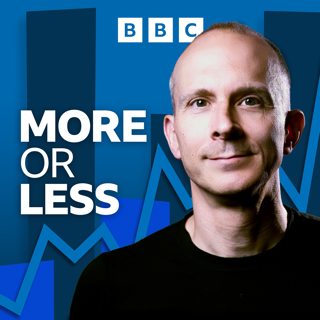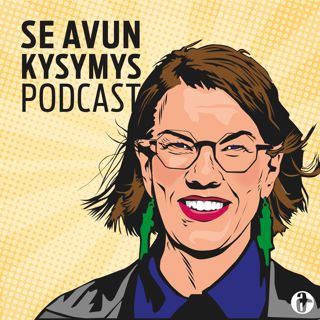
Numbers of the Year 2022
Tim Harford discusses the numbers that help explain some of the biggest stories of the year, including the war in Ukraine, soaring inflation and a breakthrough for women’s football, with the help of Olga Ivshina, correspondent for the BBC Russian service; Chris Giles, economics editor of the Financial Times; Linda Bauld, professor of public health at the University of Edinburgh and Georgina Sturge, author and House of Commons statistician.
24 Joulu 20228min

Qatar World Cup: the pressure of penalties
The World Cup in Qatar is drawing to a close. Penalties and penalty shootouts have provided some of the biggest moments of the tournament. We analyse penalty data from the World Cup and ask what boosts the chance of scoring from the spot, with the help of Ben Lyttleton, author of Twelve Yards: The Art and Psychology of the Perfect Penalty.
17 Joulu 20228min

Why are data so important in determining how we live?
Why are good data so important to policymakers – whether they know it or not – and what happens when good data is missing? Presenter Tim Harford speaks to Georgina Sturge, a statistician at the House of Commons library in London and the author of Bad Data: How Governments, Politicians and the Rest of Us Get Misled by Numbers.
10 Joulu 20228min

The World Cup: how many migrant workers have died?
Qatar has been fiercely criticised over its treatment of migrant workers, many of whom have been employed to build stadiums and other infrastructure in preparation for the 2022 World Cup. We look at the wildly varying estimates of the number of migrant deaths with the help of Max Tunon, head of the Qatar office of the International Labour Organisation and Steve Cockburn, head of economic and social justice at Amnesty International.
3 Joulu 202210min

When do food shortages become a famine?
Somalia is experiencing its worst drought for 40 years and there are warnings that millions of people need food assistance urgently. The UN body tasked with classifying levels of food security has projected a famine, although no official declaration has yet been made. We ask what data is used to formally categorise famine and explore some of the difficulties in collecting it, with the help of UN IPC Global Programme Manager Jose Lopez and Professor Laura Hammond, Pro Director of Research & Knowledge Exchange at SOAS. Presenter & producer: Jon Bithrey Editor: Simon Watts Production Coordinator: Jacqui Johnson Sound Engineer: James Beard(Image: People affected by the worsening drought due to failed rain seasons, look on, at the Alla Futo camp for internally displaced people, in the outskirts of Mogadishu, Somalia. REUTERS/Feisal Omar)
26 Marras 20228min

A $220 billion World Cup?
As the FIFA World Cup in Qatar gets underway, and the newly built stadia, lavish hotels and transport networks come to life, More or Less investigates just how much the Gulf nation has spent in the lead-up to the tournament. Reports claim the figure could be as much as $220 billion - that’s more than Qatar's annual GDP, and more than ten times higher than the 2014 World Cup in Brazil. At an estimated $15 billion, this was previously the most expensive tournament to date. With no access to Qatar’s accounts, and with very few official figures in circulation, More or Less has recruited some of the world’s leading experts in sports finance to crunch the numbers and to ask…is this really a $220 billion World Cup?Presenter: Paul Connolly Producers: Paul Connolly and Jon Bithrey Editor: Simon Watts Production Coordinator: Jacqui Johnson Sound Engineer: Rod Farquhar (Image: Al Wakrah Stadium, the second FIFA World Cup Qatar 2022 (TM) venue: The 2022 Supreme Committee for Delivery and Legacy via Getty Images)
19 Marras 20228min

Bonus Episode: Understand the Economy
Tim Harford brings you the first episode of his new podcast, Understand the Economy. If you’ve been missing his dulcet tones, here’s a chance for you to have a preview of Tim Harford’s latest podcast, in which he offers really simple explanations to help make sense of the economy today. If you enjoy it, you can find the rest of the series on BBC Sounds or wherever you get your podcasts. In this episode, inflation. What is inflation, why does it matter, and is someone to blame if it goes up? Understanding inflation will help you understand why your shopping is getting more and more expensive and why prices rarely seem to go down. Tim Harford explains why the inflation figure you see on the TV might not reflect the price rises you’re experiencing and economic historian Victoria Bateman tells us why having a boat load of silver coins isn’t always a good thing. Everything you need to know about the economy and what it means for you. This podcast will cut through the jargon to bring you clarity and ensure you finally understand all those complicated terms and phrases you hear on the news. Inflation, GDP, Interest rates, and bonds, Tim Harford and friends explain them all. We’ll ensure you understand what’s going on today, why your shopping is getting more expensive or why your pay doesn’t cover your bills. We’ll also bring you surprising histories, from the war hungry Kings who have shaped how things are counted today to the greedy merchants flooding Spain with Silver coins. So if your eyes usually glaze over when someone says ‘cutting taxes stimulates growth’, fear no more, we’ve got you covered.Producer: Phoebe KeaneResearcher: Drew HyndmanEditor: Clare FordhamFind all the episodes here: https://www.bbc.co.uk/programmes/m001dwr7 A BBC Long Form Audio Production for BBC Radio 4
14 Marras 202214min

Improving the numbers in the news
How can journalists improve their use of statistics in their reporting of the world around us? It’s a question US academics John Bailer and Rosemary Pennington tackle in their new book Statistics Behind the Headlines. They join Tim Harford to talk about how journalism can be improved by asking the right questions about numbers and using them in the wider context of a story. Presenter: Tim Harford Producer: Jon Bithrey Editor: Simon Watts Production Coordinator: Jacqui Johnson Sound Engineer: Graham Puddifoot(Image: Electronic and paper media: scanrail/Getty)
12 Marras 20228min





















